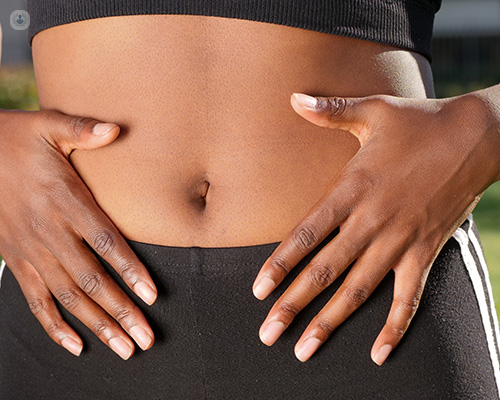What is a capsule endoscopy?
A capsule endoscopy is a minimally invasive method of examining the digestive system. It was a breakthrough in the study of the digestive system due to its capacity to allow specialists to observe and diagnose injuries and conditions of the entire digestive tract, not only a part of it.
Unlike a gastrointestinal endoscopy (in which a flexible tube with a camera is inserted through the mouth), a capsule endoscopy does not cause discomfort or risk of injury. However, a gastrointestinal endoscopy provides the opportunity to take biopsies or perform some treatments during the examination. This is not possible with a capsule endoscopy.

What does a capsule endoscopy consist of?
Before swallowing an endoscopic capsule, patients are required to go through a fasting period. The length of this fasting period will be specified by a doctor.
A capsule endoscopy simply involves swallowing a small capsule with a micro-camera inside it. This camera transmits images of the digestive tract while it passes through it. The capsule will move through the body due to natural contractions in the digestive system and will eventually be expelled naturally through the anus one to two days later.
Why is an endoscopic capsule used?
The endoscopic capsule is used to diagnose or evaluate the following conditions:
- chronic anaemia
- gastrointestinal haemorrhage (bleeding)
- Crohn's disease
- small intestine neoplasms
- coeliac disease
- tumours
- intestinal malabsorption
- unexplained chronic abdominal pain
Preparation for the endoscopic capsule
Your specialist will likely recommend the following:
- Avoid medicines that contain iron for at least ten days before the test.
- A low-fibre diet for at least three days before the test.
- Maintain a liquid diet the day before.
- Take a laxative solution 24 hours before the test to cleanse the intestine.
- Do not eat 8 hours before the test.
What does it feel like during the test?
The person taking the capsule won’t be able to feel it inside them. Instead, they will feel the same as they usually do.
What do abnormal results mean?
If the images from the capsule don’t identify any conditions or problems, the digestive system will very likely not have the condition in question. Sometimes, results show that the patient has Crohn's disease, intestinal bleeding, neoplasms, anaemia or other conditions, which will then be addressed and treated by a specialist.
11-13-2012 09-06-2023Capsule endoscopy
Dr Carlo Nunes - Gastroenterology
Created on: 11-13-2012
Updated on: 09-06-2023
Edited by: Jay Staniland
What is a capsule endoscopy?
A capsule endoscopy is a minimally invasive method of examining the digestive system. It was a breakthrough in the study of the digestive system due to its capacity to allow specialists to observe and diagnose injuries and conditions of the entire digestive tract, not only a part of it.
Unlike a gastrointestinal endoscopy (in which a flexible tube with a camera is inserted through the mouth), a capsule endoscopy does not cause discomfort or risk of injury. However, a gastrointestinal endoscopy provides the opportunity to take biopsies or perform some treatments during the examination. This is not possible with a capsule endoscopy.

What does a capsule endoscopy consist of?
Before swallowing an endoscopic capsule, patients are required to go through a fasting period. The length of this fasting period will be specified by a doctor.
A capsule endoscopy simply involves swallowing a small capsule with a micro-camera inside it. This camera transmits images of the digestive tract while it passes through it. The capsule will move through the body due to natural contractions in the digestive system and will eventually be expelled naturally through the anus one to two days later.
Why is an endoscopic capsule used?
The endoscopic capsule is used to diagnose or evaluate the following conditions:
- chronic anaemia
- gastrointestinal haemorrhage (bleeding)
- Crohn's disease
- small intestine neoplasms
- coeliac disease
- tumours
- intestinal malabsorption
- unexplained chronic abdominal pain
Preparation for the endoscopic capsule
Your specialist will likely recommend the following:
- Avoid medicines that contain iron for at least ten days before the test.
- A low-fibre diet for at least three days before the test.
- Maintain a liquid diet the day before.
- Take a laxative solution 24 hours before the test to cleanse the intestine.
- Do not eat 8 hours before the test.
What does it feel like during the test?
The person taking the capsule won’t be able to feel it inside them. Instead, they will feel the same as they usually do.
What do abnormal results mean?
If the images from the capsule don’t identify any conditions or problems, the digestive system will very likely not have the condition in question. Sometimes, results show that the patient has Crohn's disease, intestinal bleeding, neoplasms, anaemia or other conditions, which will then be addressed and treated by a specialist.


Capsule endoscopy: how long does it take to pass?
By Dr John Martin
2024-11-21
Capsule endoscopy is a technique that allows visualisation of the entire gastrointestinal tract to enable doctors to diagnose conditions such as coeliac disease and inflammation of the gut. Expert gastroenterologist Dr John Martin explains how the procedure works and how long the capsule takes to pass. See more


Video capsule endoscopy: special considerations
By Dr Amit Chattree
2024-11-21
Have you ever wondered how even the smallest and narrowest of areas in the intestine can be examined? In this article we found out how a video capsule endoscopy can be used to check the lining of the small intestine and whether problems can occur from this procedure. Leading gastroenterologist, Dr Amit Chattree, talked us through preparation using a patency capsule , potential risks and whether or not the capsule can get stuck inside of the bowel. See more


A hard pill to swallow? All you need to know about capsule endoscopy
By Dr Alberto Murino
2024-11-20
Capsule endoscopy, which takes images of your gut and provides essential information for doctors regarding diagnosis of small or large bowel conditions, is an option for those looking to avoid invasive surgery. Respected consultant gastroenterologist Dr Alberto Murino is here to explain further about this fascinating and useful innovation. See more


Capsule endoscopy: Advancements and insights
By Professor Owen Epstein
2024-11-20
In his latest online article, Professor Owen Epstein gives us his insights into capsule endoscopy. He talks about what the procedure consists of, the potential limitations or contraindications, the preparation and what strategies or techniques can be employed to ensure optimal image quality and complete visualisation of the colon. See more
Experts in Capsule endoscopy
-
Dr Edward John Despott
GastroenterologyExpert in:
- Double balloon enteroscopy
- Endoscopy
- Colonoscopy
- Gastroscopy
- Capsule endoscopy
- Polyps
-
Dr John Martin
GastroenterologyExpert in:
- Colonoscopy
- Capsule endoscopy
- Inflammatory bowel disease (IBD)
- Polypectomy
- Irritable bowel syndrome (IBS)
- Bloated stomach
-
Dr Sameer Zar
GastroenterologyExpert in:
- Endoscopy
- Colonoscopy
- ERCP
- Endoscopic ultrasound (EUS)
- Acid reflux
- Capsule endoscopy
-
Dr Andrew Fagbemi
Paediatric gastroenterologyExpert in:
- Inflammatory bowel disease (IBD)
- Food intolerance
- Acid reflux
- Constipation
- Irritable bowel syndrome (IBS)
- Capsule endoscopy
-
Professor Owen Epstein
GastroenterologyExpert in:
- Capsule endoscopy
- Cancer screening
- Irritable bowel syndrome (IBS)
- Virtual colonoscopy
- Digestive diseases
- Indigestion (dyspepsia)
- See all

The Chaucer Hospital - part of Circle Health Group
The Chaucer Hospital - part of Circle Health Group
Nackington Rd, Canterbury CT4 7AR,
No existe teléfono en el centro.
By using the telephone number provided by TOP DOCTORS, you automatically agree to let us use your phone number for statistical and commercial purposes. For further information, read our Privacy Policy
Top Doctors

New Victoria Hospital
New Victoria Hospital
184 Coombe Lane West, Kingston upon Thames, KT2 7EG
No existe teléfono en el centro.
By using the telephone number provided by TOP DOCTORS, you automatically agree to let us use your phone number for statistical and commercial purposes. For further information, read our Privacy Policy
Top Doctors

The Alexandra Hospital - part of Circle Health Group
The Alexandra Hospital - part of Circle Health Group
Mill Ln, Cheadle
No existe teléfono en el centro.
By using the telephone number provided by TOP DOCTORS, you automatically agree to let us use your phone number for statistical and commercial purposes. For further information, read our Privacy Policy
Top Doctors
-
The Chaucer Hospital - part of Circle Health Group
Nackington Rd, Canterbury CT4 7AR,, CanterburyExpert in:
- Hip
- Cataracts
- Orthopaedic surgery
- Ophthalmology
- Knee
-
New Victoria Hospital
184 Coombe Lane West, Kingston upon Thames, KT2 7EG, South LondonExpert in:
- Cardiology
- General Surgery
- Orthopaedic surgery
- Breast augmentation
- Pain management
- Spine
-
The Alexandra Hospital - part of Circle Health Group
Mill Ln, Cheadle, CheadleExpert in:
- Hip
- Cardiology
- Shoulder and elbow
- Paediatrics
- Foot and ankle
- Knee
- Most viewed diseases, medical tests, and treatments
- Migraine
- Paediatric rheumatology
- Autoimmune diseases
- Joint pain
- Child nutrition
- Nutrition
- Abdominal pain
- Heart murmur in children
- Anxiety
- Paediatric orthopaedics








